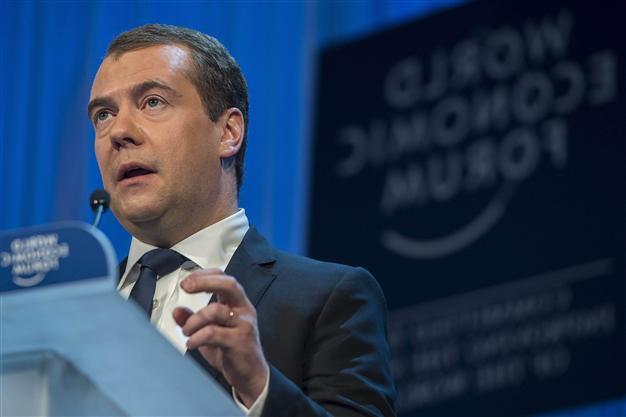Assad’s chances getting smaller, says Medvedev
MOSCOW - Agence France-Presse

Russian Prime Minister Dmitry Medvedev addresses on January 23, 2013 a session of the annual World Economic Forum (WEF) meeting in the Swiss resort of Davos. EPA Photo
Syrian President Bashar al-Assad’s chances of retaining power are getting smaller and smaller every day, Russian Prime Minister Dmitry Medvedev has said, while admitting the embattled leader made a “grave and perhaps fatal error” by delaying political reforms, in the latest stark warning from the country’s chief ally.
“I think that with every day, every week and every month the chances of his preservation are getting smaller and smaller,” Medvedev was quoted as saying in an interview with CNN on the sidelines of the Davos World Economic Forum in Switzerland, released by his office on Jan. 27.
While Medvedev’s remarks were the most vocal Russian statement that al-Assad’s days could be numbered made so far, the prime minister reiterated calls for talks between the government and its foes. Medvedev also repeated Moscow’s position that al-Assad must not be pushed out by external forces. “I repeat again, this must be decided by the Syrian people. Not Russia, not the United States, not any other country.”
“The task for the United States, the Europeans and regional powers ... is to sit the parties down for negotiations, and not just demand that al-Assad go and then be executed like (the late former Libyan leader Moammar) Gadhafi or be carried to court sessions on a stretcher like (Egypt’s) Hosni Mubarak.”
The prime minister has also recently criticized the Syrian president over his reform process. “He should have acted much more quickly and reached out to the peaceful opposition which was ready to sit at the negotiating table with him,” Russian news agencies quoted Medvedev as saying.
“It’s a grave error on his part, perhaps fatal,” he said. Russia has criticized the Syrian opposition living in exile and the West that al-Assad’s exit cannot be a precondition for a deal to end the country’s conflict. “We are not concerned about the fate of al-Assad’s regime. We understand what is going on there and that the family has held power for 40 years. Undoubtedly, there is a call for changes,” Russian President Vladimir Putin said in a news conference in December. “We are worried about a different thing, what next? We simply don’t want the current opposition, having become the authorities, to start fighting the people who are the current authorities ... and [we don’t want] this to go on forever.”
Medvedev’s comments came as Syria’s high judicial council announced a suspension of prosecutions of opposition members so they can join a national dialogue, state media reported yesterday, without detailing the nature of crimes affected by the ruling.
The report comes after Interior Minister Mohammed al-Shaar had earlier vowed to ease the return of Syrian opposition members living in exile so that they too could take part in the dialogue proposed by al-Assad on Jan. 6.
“The high judicial council has decided to discontinue all prosecutions against opposition forces and individuals so they may participate in the national dialogue,” the official news agency SANA said without elaborating further.
The council stressed that those “opposition forces will be designated by the government or first ministerial action group charged with implementing the preparatory phase of the program to resolve the Syrian crisis.” In his Jan. 6 speech, al-Assad proposed a dialogue with opposition figures who were not “slaves of the West” and on condition that “terrorist attacks” came to a halt before any political transition.
Al-Shaar said the directive allowing Syrians living abroad to return was not a blanket amnesty.
“Executive orders will be issued to border crossings to facilitate and guarantee that all political opposition forces may enter the country, maintain residency and leave at will,” Shaar was quoted as saying. “There is a big difference between those who safeguard their nation and those who are complicit in foreign agendas.”
Compiled from Reuters and AFP stories by the Daily News staff.
